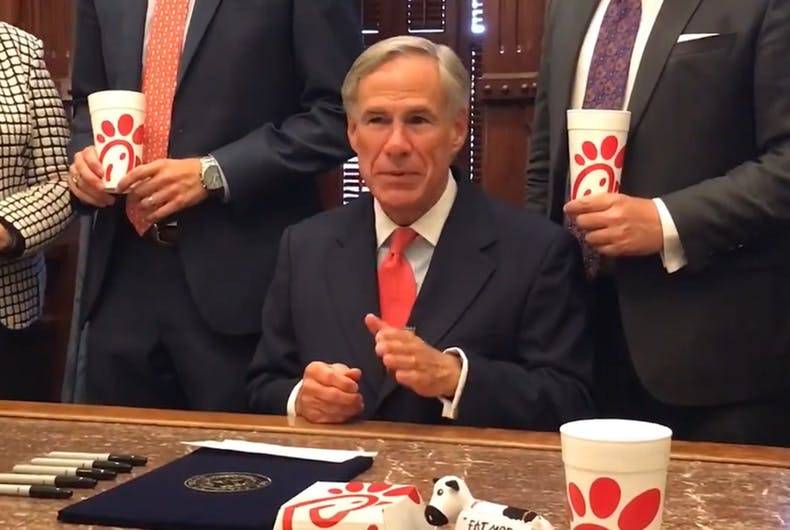Supreme Court Rejects Texas’ Lawsuit Against California Over LGBT+ Adoption Law
In a 7-2 decision, the Supreme Court rejected a request by the state of Texas to allow them to file a complaint against the state of California for banning state-funded travel to the Lone Star State in response to an anti-LGBT+ law.
Texas, under the administration of Gov. Greg Abbott (R) and elected Attorney General Ken Paxton (R), passed a law in 2017 that allowed foster care and adoption agencies to refuse to work with potential parents who don’t follow the agencies’ religious principles, even if they receive state funds. So California put the state on a lists that state institutions cannot use state funds to send staff, board members, or students to.

When California banned travel to Texas in 2017, Gov. Abbott joked that California businesses would “flee over taxation and regulation” and move to Texas. Three years later, Texas filed a lawsuit, claiming the Golden State was discriminating against them by not paying for state employees’ travel.
Paxton claimed in the motion filed with the Supreme Court in February 2020 that California’s law is unconstitutional. While the Constitution does not ban states from treating other states differently, Paxton argued that California’s ban interferes with interstate commerce by placing unfair limitations on business.
He claimed, “Nothing requires California to fund interstate travel… but when California chooses to do so, it must not invidiously discriminate against other States and those States’ citizens and businesses.”
The motion even trolled LGBT+ advocates by citing Lawrence v. Texas – a major LGBT+ Supreme Court victory that ended sodomy laws in the United States in 2003 – to say that expressing moral disapproval is not a legitimate state interest.
“The motion for leave to file a bill of complaint is denied,” the Supreme Court ordered among a series of quick rulings issued and revealed yesterday. A dissent written by conservative justice Samuel Alito followed, and he was supported by justice Clarence Thomas.
Alito’s dissent opened with a hypothetical, comparing California’s choice not to spend state funding on travel to a state with allegedly discriminatory policies to a federal court refusing to hear a civil issue between citizens of different states.
“What would we do? We would reverse in the blink of an eye. We might also wag a finger at the lower courts,” Alito claimed. “If this is how we would respond to this imaginary Texan versus Californian tort suit, how can we refuse to allow the filing of the complaint in this case?”
Citing the constitutional requirement that disputes between states are under the jurisdiction of the Supreme Court, Alito further complained that the Court was leaving Texas “without any judicial forum” to challenge another state’s action.
Alito admitted that “in fairness to the Court, what it does in this case – claiming the discretion to refuse to entertain Texas’s suit – is consistent with a practice the Court has followed for the past 45 years.” He then argued that no court from the 1700s or 1800s considered not hearing a supposed dispute between states.
“I express no view regarding any of those claims, but I respectfully dissent,” he concluded.
Ten other states fall within California’s ban on interstate travel: Alabama, Iowa, Kansas, Kentucky, Mississippi, North Carolina, Oklahoma, South Carolina, South Dakota, and Tennessee.
According to ‘LGBTQ Nation’, the states on the list are determined by the California Attorney General, who prior to this year was Xavier Becerra. Becerra is now the Secretary of Health & Human Services in the Biden administration. Becerra’s confirmation was difficult, in part because of his advocacy for LGBT+ rights, such as his use of this policy.
While the ban may restrict a limited amount of travel by state workers, it doesn’t stop the highest-profile and most important trips. The law prohibits “state-funded or state-sponsored” travel, but there are a bunch of carve-outs to the ban, allowing for travel that includes things like auditing, job training, or anything that is required to get grant money.
Read related myGwork articles here:
Hungary Passes Law Banning LGBT+ Adoption
Supreme Court Hears Case Whether Adoption Agencies Can Discriminate Against LGBT+ People
An Adoption Agency Was Told To Stop Turing Away LGBT+ Couples, Court Says They Can
Judge In The U.K. Rules Christian Adoption Agency Cannot Ban LGBT+ Parents
Keep up to date with the latest myGnews

